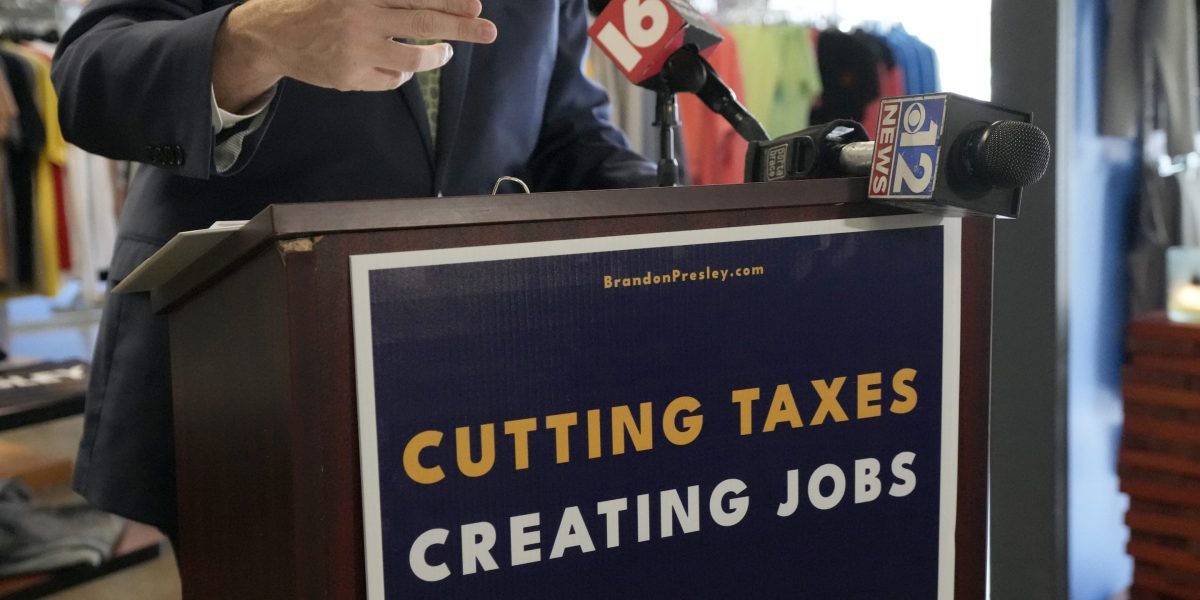About 45 years have passed since a U.S. state last eliminated its income tax on wages and salaries. But with recent actions in Mississippi and Kentucky, two states now are on a path to do so, if their economies keep growing.
The push to zero out the income tax is perhaps the most aggressive example of a tax-cutting trend that swept across states as they rebounded from the COVID-19 pandemic with surging revenues and historic surpluses.
But it comes during a time of greater uncertainty for states, as they wait to see whether President Donald Trump’s cost cutting and tariffs lead to a reduction in federal funding for states and a downturn in the overall economy.
Some fiscal analysts also warn the repeal of income taxes could leave states reliant on other levies, such as sales taxes, that disproportionately affect the poor.
Which governments charge income tax?
The 16th Amendment to the U.S. Constitution grants Congress the power to levy income taxes. It was ratified by states in 1913. Since then, most states have adopted their own income taxes.
Eight states currently charge no personal income tax: Alaska, Florida, New Hampshire, Nevada, South Dakota, Tennessee, Texas and Wyoming. A ninth state, Washington, charges no personal income tax on wages and salaries but does tax certain capital gains income over $270,000.
When Alaska repealed its personal income tax in 1980, it did so because state coffers were overflowing with billions of dollars in oil money.
Though income tax eliminations have been proposed elsewhere, they have not been successful.
“It’s a lot easier to go without an individual income tax if you’ve never levied one,” said Katherine Loughead, a senior analyst and research manager at the nonprofit Tax Foundation. “But once you become dependent on that revenue, it is a lot more difficult to phase out or eliminate that tax.”
What is Mississippi doing?
Republican Mississippi Gov. Tate Reeves recently signed a law gradually reducing the state’s income tax rate from 4% to 3% by 2030 and setting state revenue growth benchmarks that could trigger additional incremental cuts until the tax is eliminated. The law also reduces the sales tax on groceries and raises the gasoline tax.
If cash reserves are fully funded and revenue triggers are met each year, Mississippi’s income tax could be gone by 2040.
Supporters of an income tax repeal hope it will attract both businesses and residents, elevating the state’s economy to the likes of Florida, Tennessee and Texas. Their theory is that when people pay less in income taxes, they will have more money to spend, thus boosting sales tax collections.
The tax repeal “puts us in a rare class of elite, competitive states,” Reeves said in a statement. He added, “Mississippi has the potential to be a magnet for opportunity, for investment, for talent –- and for families looking to build a better life.”
Mississippi is among the most impoverished states and relies heavily on federal funding. Democratic lawmakers warned the state could face a financial crises if cuts in federal funding come at the same time as state income tax reductions.
The income tax provides “a huge percentage of what the state brings in to fund things like schools and health care and services that everybody relies on,” said Neva Butkus, senior analyst at the nonprofit Institute on Taxation and Economic Policy.
What has Kentucky done?
A 2022 Kentucky law reduced the state’s income tax rate and set a series of revenue-based triggers that could gradually lower the tax to zero. But unlike in Mississippi, the triggers aren’t automatic. Rather, the Kentucky General Assembly must approve each additional decrease in the tax rate.
That has led to a series of tax-cutting measures, including two new laws this year. One implements the next tax rate reduction from 4% to 3.5% starting in 2026. The second makes it easier to continue cutting the tax rate in the future by allowing smaller incremental reductions if revenue growth isn’t sufficient to trigger a 0.5 percentage point reduction.
Democratic Gov. Andy Beshear signed the legislation for next year’s tax cut but let the other measure passed by the Republican-led legislature become law without his signature. Beshear called it a “bait-and-switch” bill, contending lawmakers had assured the guardrails for income tax reductions would remain in place while pushing for the 2026 tax cut, then later in the session altered the triggers for future years.
What actions have other states taken?
New Hampshire and Tennessee already did not tax income from wages and salaries, but both states had taxed certain types of income.
In 2021, Tennessee ended an income tax on interest from bonds and stock dividends that had been levied since 1929.
New Hampshire halted its tax on interest and dividends at the start of this year.
Some other states also are pushing to repeal income taxes. The Oklahoma House passed legislation in March that would gradually cut the personal income tax rate to zero if revenue growth benchmarks are met. That bill now is in the Senate.
New Missouri Gov. Mike Kehoe, a Republican, also wants to phase out the income tax. The House and Senate have advanced legislation that would take an incremental step by exempting capital gains income from taxes.
This story was originally featured on Fortune.com
Source link


 Entertainment8 years ago
Entertainment8 years ago
 Politics8 years ago
Politics8 years ago
 Entertainment8 years ago
Entertainment8 years ago
 Entertainment8 years ago
Entertainment8 years ago
 Tech8 years ago
Tech8 years ago
 Tech8 years ago
Tech8 years ago
 Tech8 years ago
Tech8 years ago
 Politics8 years ago
Politics8 years ago






